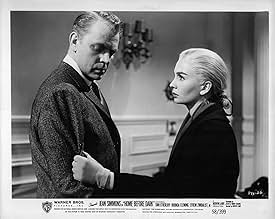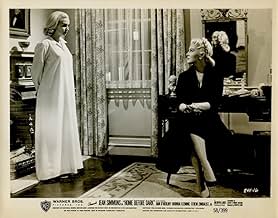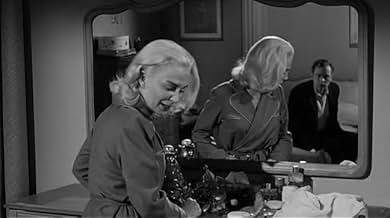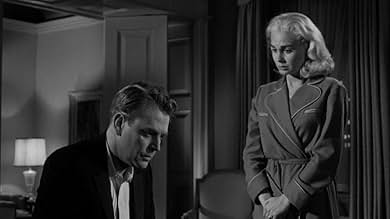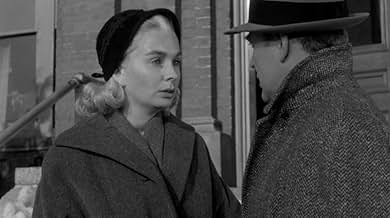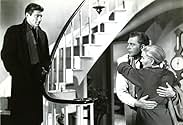IMDb रेटिंग
7.0/10
1.3 हज़ार
आपकी रेटिंग
अपनी भाषा में प्लॉट जोड़ेंSimmons is magnetic as Charlotte, her lovely, delicate face reflecting the inner turmoil of a woman battling for sanity after she walks out of a mental institution.Simmons is magnetic as Charlotte, her lovely, delicate face reflecting the inner turmoil of a woman battling for sanity after she walks out of a mental institution.Simmons is magnetic as Charlotte, her lovely, delicate face reflecting the inner turmoil of a woman battling for sanity after she walks out of a mental institution.
- पुरस्कार
- 4 कुल नामांकन
Stephen Dunne
- Hamilton Gregory
- (as Steve Dunne)
Walter Bacon
- Professor Dennison
- (बिना क्रेडिट के)
Fred C. Blau Jr.
- Male Patient
- (बिना क्रेडिट के)
Gail Bonney
- Mental Hospital Clerk
- (बिना क्रेडिट के)
Evelyn Clarke
- Receptionist
- (बिना क्रेडिट के)
Lillian Culver
- Mrs. Franklin
- (बिना क्रेडिट के)
Susan Davis
- Saleslady
- (बिना क्रेडिट के)
फ़ीचर्ड समीक्षाएं
I was amused while watching this suspenseful film to notice that whole passages of the music used were lifted straight from Warner's great Bette Davis film, "Now Voyager". Since it was a Warner's film I suppose they had the right. I noticed that Max Steiner, the composer from the Davis film, was given no credit for the music that was used in this film. Seems a shame, but I suppose that's Hollywood. Still, this is a good film with a fine cast of stars and familiar character actors. I enjoyed the location photography and the chilled atmosphere of the film is enhanced by the obvious dead of winter scenery. I mainly just wanted to comment on the music, however, it just surprised me to hear such a familiar score used over again in this film.
Charlotte (Jean Simmons) comes home from a mental hospital, shaky but game. She's been cured of all her delusions - that her husband and stepsister are having an affair, and conspiring behind her back. Except that her husband (Dan O'Herlihy) really does crave her stepsister (Rhonda Fleming) and they do talk about her in whispered tones. Even their new lodger (Efrem Zimbalist) can see it. But they deny it and she tries to deny it some more, to keep peace in the family. Finally, she can't. Is she having a breakdown or a breakout?
Admittedly, it is slow - the direction is cumbersome. But occasionally, it nails Eileen Bassing's novel with its stifling New England academic atmosphere and the rigidity of its codes. Jean Simmons was nominated for Best Actress in this role, and small wonder; it's one of her best this side of Elmer Gantry. Steve Dunne has an engaging appearance, and it's Rhonda Fleming who gets to be unsympathetic for a change.
If I could find the video, I'd buy it. But it's not for teenaged boys.
Admittedly, it is slow - the direction is cumbersome. But occasionally, it nails Eileen Bassing's novel with its stifling New England academic atmosphere and the rigidity of its codes. Jean Simmons was nominated for Best Actress in this role, and small wonder; it's one of her best this side of Elmer Gantry. Steve Dunne has an engaging appearance, and it's Rhonda Fleming who gets to be unsympathetic for a change.
If I could find the video, I'd buy it. But it's not for teenaged boys.
This cross between 'a women's picture' and a semi-serious study of mental illness isn't as well known as it ought to be. Maybe if it had been made ten or fifteen years earlier it might have been something of a classic since we're firmly in Bette Davis/Miriam Hopkins territory here. Jean Simmons, (wonderful, but then she was always wonderful), is the woman who comes home after a year in a mental hospital. Home is where she lives with hubbie Dan O'Herlihy, step-sister Rhonda Fleming, step-mother Mabel Albertson and handsome lodger Efrem Zimbalist Jr. and it isn't too long before the reason for her initial breakdown becomes all too clear.
At two and a quarter hours it's a little on the long side but director Mervyn LeRoy certainly demonstrates just why he was considered a consumate jobbing director in his handling of old-hat material and all the performances are first-rate, (Simmons was robbed of a Best Actress Oscar nomination), and its small-town New England setting is at least unusual. However, by 1958 this was a very old-fashioned film and no amount of professionalism in front of or behind the camera was going to turn this into box-office gold. A pity, as it's really rather good.
At two and a quarter hours it's a little on the long side but director Mervyn LeRoy certainly demonstrates just why he was considered a consumate jobbing director in his handling of old-hat material and all the performances are first-rate, (Simmons was robbed of a Best Actress Oscar nomination), and its small-town New England setting is at least unusual. However, by 1958 this was a very old-fashioned film and no amount of professionalism in front of or behind the camera was going to turn this into box-office gold. A pity, as it's really rather good.
I can certainly sympathize with those who have commented about the lack of a video release of this title, and their disappointment at its apparent abandonment in the archives of TV broadcasters. I saw it during its initial theatrical release, when some very positive critical notices told me I'd be in for a much-better-than-average viewing experience. Not only was I impressed with its quality but, even though I've never seen it since, I can still quite easily recall several of its key sequences and the excellent performances by everyone in the cast.
After quite a run at Twentieth-Century Fox in a long string of their CinemaScope costumers, Jean Simmons must have truly enjoyed exercising her considerable talents as an actress with the lead role in "Home Before Dark," under the steady hand of Hollywood veteran, Mervyn LeRoy. He was one director who always seemed to get the best out of his casts and had a special gift, it seems to me, of eliciting surprisingly good performances from those lovely ladies, such as Rhonda Fleming in this one, who were usually thought of merely as "glamor girls."
When this film was released I was a relatively new resident of southern California, so its effective use of Boston and other Massachusetts locations, where I'd been born and raised until almost entering my teens, may be the reason that the memory of this film is still quite vivid. Those of us who would like to see a video release might nurture a wisp of hope, what with so many more films now enjoying an entry onto the video catalogues. It's certainly worthy of a place along some of Hollywood's better psychological dramas.
After quite a run at Twentieth-Century Fox in a long string of their CinemaScope costumers, Jean Simmons must have truly enjoyed exercising her considerable talents as an actress with the lead role in "Home Before Dark," under the steady hand of Hollywood veteran, Mervyn LeRoy. He was one director who always seemed to get the best out of his casts and had a special gift, it seems to me, of eliciting surprisingly good performances from those lovely ladies, such as Rhonda Fleming in this one, who were usually thought of merely as "glamor girls."
When this film was released I was a relatively new resident of southern California, so its effective use of Boston and other Massachusetts locations, where I'd been born and raised until almost entering my teens, may be the reason that the memory of this film is still quite vivid. Those of us who would like to see a video release might nurture a wisp of hope, what with so many more films now enjoying an entry onto the video catalogues. It's certainly worthy of a place along some of Hollywood's better psychological dramas.
When the film begins, you learn that Charlotte Bronn (Jean Simmons) had been in a mental hospital for a year and was ready for discharge. Oddly, it also seems as if there's been no family therapy or plans for after discharge...a bit of a mistake in the film, I think, as I cannot imagine the hospital doing this. Apparently, Charlotte's husband, Arnold (Dan O'Herlihy) also had not visited her during this year AND he has no plans on changing the family structure which existed when Charlotte lost her mind and attacked her step-sister, Joan (Rhonda Fleming). Yet, oddly, she's discharged. I think it would have made more sense having the staff argue with Arnold and mention these problems---and he checked her out against medical advice. This portion of the movie could have been constructed better.
When Charlotte returns home, you can almost instantly see what drove her off the deep end. Her step-mother (Mabel Albertson) is god- awful--a controlling know-it-all who would have probably gotten Mother Theresa to attack her after being around her more than five minutes! Albertson made a career out of playing these awful mothers...and anyone who knows 60s TV will instantly recognize her. As for the step- sister, there are hints through the course of the movie that Joan and Arnold MIGHT be carrying on behind Charlotte's back...or at least Arnold simply didn't care that Charlotte might think this. He was certainly very cold and very distant throughout the film. In many, many ways, the story seems like a primer to teach family members how to keep mentally ill loved ones mentally ill or drive them over the edge. Is there any hope for poor Charlotte and this kooky bunch? And what about the new boarder, Jake (Efram Zimbalist Jr.)?
As I was at one time a mental health therapist, I see that the film has an excellent point to make. Returning to the exact same unhealthy environment is a sure way for disaster if you have psychological or addiction issues. Changing the family or leaving them entirely when they are resistant to change is something most decent therapists would consider working on with their clients as they face discharge. Because of this, I really appreciate the movie and it talks about things rarely talked about in films about mental illness. It's often NOT just the mentally ill person that is sick but the family structure.
As far as entertainment value goes, this film is very enjoyable and late in the film you really begin to wonder what is actually happening. Is Charlotte losing her mind or is Arnold trying to drive her over the edge...or both? My only quibble (other than the one mentioned in the first paragraph) is that the film went on too long and the portion consisting of them going to visit Harvard didn't seem to quite fit with the rest of the movie. Still, very compelling and different..and the very end was great.
When Charlotte returns home, you can almost instantly see what drove her off the deep end. Her step-mother (Mabel Albertson) is god- awful--a controlling know-it-all who would have probably gotten Mother Theresa to attack her after being around her more than five minutes! Albertson made a career out of playing these awful mothers...and anyone who knows 60s TV will instantly recognize her. As for the step- sister, there are hints through the course of the movie that Joan and Arnold MIGHT be carrying on behind Charlotte's back...or at least Arnold simply didn't care that Charlotte might think this. He was certainly very cold and very distant throughout the film. In many, many ways, the story seems like a primer to teach family members how to keep mentally ill loved ones mentally ill or drive them over the edge. Is there any hope for poor Charlotte and this kooky bunch? And what about the new boarder, Jake (Efram Zimbalist Jr.)?
As I was at one time a mental health therapist, I see that the film has an excellent point to make. Returning to the exact same unhealthy environment is a sure way for disaster if you have psychological or addiction issues. Changing the family or leaving them entirely when they are resistant to change is something most decent therapists would consider working on with their clients as they face discharge. Because of this, I really appreciate the movie and it talks about things rarely talked about in films about mental illness. It's often NOT just the mentally ill person that is sick but the family structure.
As far as entertainment value goes, this film is very enjoyable and late in the film you really begin to wonder what is actually happening. Is Charlotte losing her mind or is Arnold trying to drive her over the edge...or both? My only quibble (other than the one mentioned in the first paragraph) is that the film went on too long and the portion consisting of them going to visit Harvard didn't seem to quite fit with the rest of the movie. Still, very compelling and different..and the very end was great.
क्या आपको पता है
- ट्रिवियाSince this was a film by Warner Brothers, much of the soundtrack was stock and is the same as used in their 1942 film Now, Voyager (1942).
- गूफ़Arnold drives Charlotte home from the hospital in a snowstorm, when plenty of snow already covers the ground. At the film's conclusion, it's New Year's Eve and Charlotte mentions that she's been home for 3 months, which means that the snowstorm happened at the end of September.
टॉप पसंद
रेटिंग देने के लिए साइन-इन करें और वैयक्तिकृत सुझावों के लिए वॉचलिस्ट करें
- How long is Home Before Dark?Alexa द्वारा संचालित
विवरण
- रिलीज़ की तारीख़
- कंट्री ऑफ़ ओरिजिन
- भाषा
- इस रूप में भी जाना जाता है
- Bevor die Nacht anbricht
- फ़िल्माने की जगहें
- Marblehead, मैसाचुसेट्स, संयुक्त राज्य अमेरिका(Interior scenes and exterior scene filmed at 2 Union St. "The Layfayette House")
- उत्पादन कंपनी
- IMDbPro पर और कंपनी क्रेडिट देखें
बॉक्स ऑफ़िस
- बजट
- $13,90,000(अनुमानित)
- चलने की अवधि
- 2 घं 16 मि(136 min)
- रंग
- पक्ष अनुपात
- 1.78 : 1
इस पेज में योगदान दें
किसी बदलाव का सुझाव दें या अनुपलब्ध कॉन्टेंट जोड़ें

